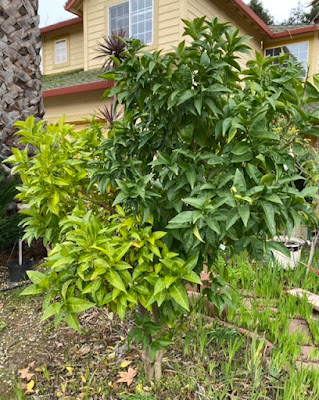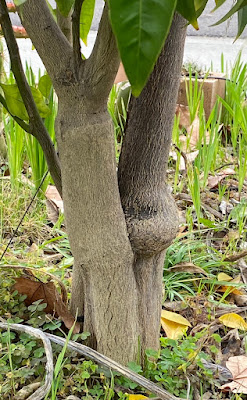As we select plants in nurseries, it is important to inspect the graft joint. This is the place where the scion meets rootstock. Unfortunately, even some commercially produced plants from reputable suppliers may have problems with the graft quality. The performance of such plants will suffer and they may be short lived. In the picture below is my Moro blood orange that I purchased years ago. This tree never grew well. A couple of years ago after noticing sprouts from the rootstock, I grafted the scions from this tree onto the sprouts. The green portion of the tree (on the right) is from my new graft, and the yellowish part is the original tree.
The lower bulbous joint is what the tree came with. There is some structural problem which affects (most likely) the vascular transport in this part of the plant. The higher graft (left) that I made, seems to be more solid structurally and its vascular system supports the flow of nutrients to keep this part of the tree green. In the coming spring, I will remove the original graft and will leave only my grafts to form this tree.Sunday, December 26, 2021
Graft quality matters
Monday, December 13, 2021
Meyer and New Zealand Lemonade lemons
These were picked from pretty young trees, ~2 years in the ground only. I wanted to evaluate NZ Lemonade, and the Meyer lemon seemed to be a good comparison candidate. I heard the NZ lemonade is a low acid one. Meyer is also not the most sour lemon.
In this comparison, Meyer seems to be pretty sour, as NZ Lemonade is almost acidless. It can be eaten like an orange. It is actually very pleasant to eat, my family and I enjoyed it.
White sapotes Vernon, Suebelle, and Lemon Gold
Out of these three cultivars, Lemon Gold tasted the best, followed by Vernon and then Suebelle. The Lemon Gold skin should be peeled as it is bitter. Lemon Gold has the most intense flavor with some caramel in it. It also seemed to be denser, in the texture. Vernon is mild and soft, but also very nice. Suebelle had some notes of not pleasant flavor. The fruit could be past its prime time.
Sunday, December 12, 2021
Shirokolistvennyi satsuma mandarin
I got this cultivar from CCPP only because it had Russian name. "Shirokolistvennyi" means "Wide leafed". The CCPP page says that it originated in the USSR. I wasn't impressed with the flavor last year, when it fruited the first time for me. However, it is different this year. I can taste the exact flavor of the mandarins, which we had in our New Year presents distributed through the Soviet schools in the 1970s (sponsored by the parents). Those who grew there would know what I'm talking about, a mixed bag of candies, walnuts and a couple of mandarins. Unfortunately, no photos of those bags are online, and if I would manage to find any, they would be black and white. Below are mine from today's tasting. The flavor is very nice, but the membranes are pretty hard now. Maybe I should be tasting them earlier in the season. I only had a few fruits from the graft on my Algerian Clementine.
Cuttings Sale in December 2025
This post describes the cuttings sale on reallygoodplants.com in December 2025. This year we are offering wood from 594 different cultivar...


















